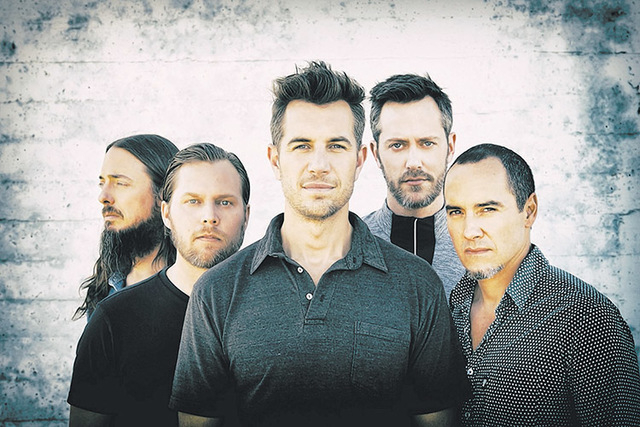How do rock bands survive for 25 years? 311 has answers
It’s nearly impossible for a band to stay together for even 10 years, but guitarist Tim Mahoney is in the position of telling us how 311 survived the music industry for 25 years.
The reggae-rock group, which came out of Nebraska (“Amber,” “Down,” “Love Song,” “Beautiful Disaster”), will perform Friday and Saturday at Mandalay Bay Beach ($55).
One of those days (probably July 4, Mahoney says), 311 will play their breakout album known as the “Blue” one, plus B-sides from that era.
While the group rehearsed in a North Hollywood studio, I asked Mahoney to tell us, generally speaking, how bands can survive success, ego, groupies, squabbles, haters, creative differences, producers, money, drugs and industry upheavals.
1. It helps when band mates like each other.
“We’ve seen a lot of really good bands come and burn out and go for whatever reason. You’re like, ‘That was a great band. What happened?’ ” Mahoney said.
“At the very core, we’re all friends. That makes a big difference,” he said. “We all lived together, shared a house back in the day. … We’re like brothers. We can get past (problems) and get along.”
2. Work with like-minded, trustworthy people.
“We’ve surrounded ourselves with a lot of good people, friends and crew guys who care,” he said. “We’ve had the same manager our whole career. I trust him.”
3. Work hard.
“We’ve seen some bands start, get real big, and it’s maybe too much to handle. I don’t know if it’s: You get comfortable and stop working?
“We’re always just trying to work, and write good songs, and make good albums, and improve,” Mahoney said. “It’s what we love to do.”
4. “Creative differences” is a real thing to navigate.
When bands break up, “a lot of times, it comes down to creative differences,” he said.
5. Solo projects can help alleviate creative differences, as long as band members respect both the band and the solo project. Singers Nick Hexum and Doug “SA” Martinez, have released solo projects without fallout.
“It wasn’t like, ‘Man, I’m going to do so much better on my own,’ ” Mahoney said. “Nick writes a lot of good songs that might not be in the 311 prism. Same thing with SA. Everyone’s supportive of all that kind of stuff.”
6. Try to make and manage money well.
“To make ends meet (and) to be a full-time band is hard. So you sometimes see that happen (break-ups over money) to really good bands.”
7. Learn from producers, engineers and other studio and tour musicians.
The band still works tightly with Scott Ralston, a band friend who shares their tastes, and who engineered 311’s first record, produced many of their songs and fills other important jobs.
8. Find your best writing methods.
While on the road, Mahoney will record guitar ideas into his phone recorder.
“I mostly try to keep track of ideas and the context of the idea. When I get home, I advance it from there.”
9. Plenty of musicians find inspiration during various drug experiences, but there are obvious pitfalls to avoid.
The most basic obstacle is when a musician becomes too incapacitated to play music, and his or her band breaks up, Mahoney said.
Also, only a few groups, like the Grateful Dead, have been able to write or record music during psychedelic excursions.
“Some people are really good at it. (But) if my hands are melting in front of me, I can’t play my guitar,” Mahoney said.
10. Have good fans who make it possible for you to play two shows at Mandalay Bay Beach on Fourth of July weekend, while debuting your own 311 Amber Ale, and releasing a box set, “311-Archive.”
“They support us. That’s how we get to keep making records and play music,” Mahoney said.
“But even if this last record wasn’t their personal favorite record, they’re willing to check out our next record, because they like our band.”
By the way, Mahoney said bands shouldn’t always keep the same core members.
“If you can’t enjoy playing music for someone, it’s a horrible thing. You don’t want to keep doing that,” he said.
However, Mahoney can’t believe Zayn Malik left boy band One Direction in March.
“I mean, maybe those guys make so much money he doesn’t have to worry about it? But where do you go from there? What were you thinking?”
Contact Doug Elfman at delfman@reviewjournal.com. He blogs at reviewjournal.com/elfman. Find him on Twitter: @VegasAnonymous




























